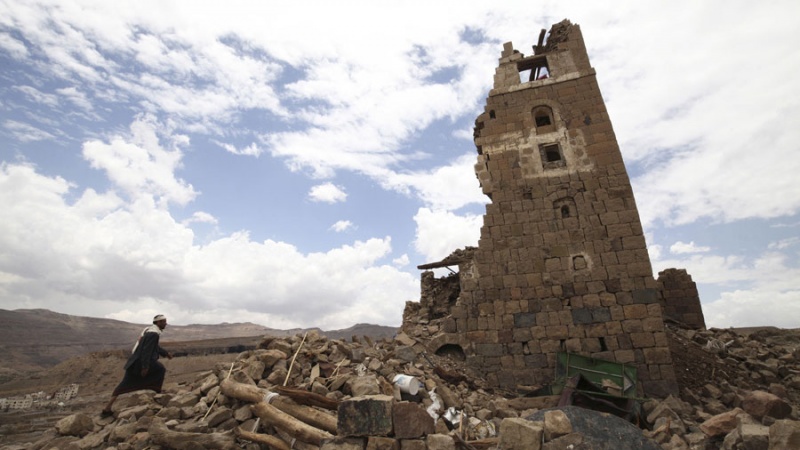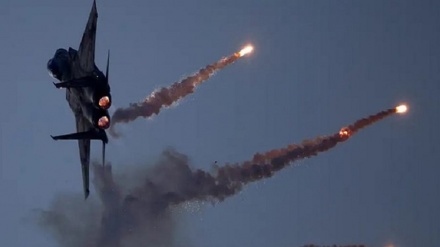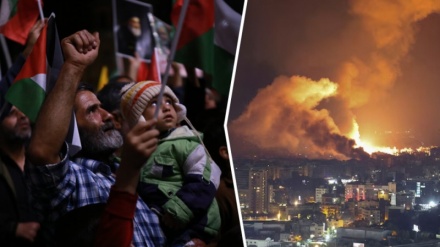The Yemen tragedy: What is the way out?
The bloody crises in Syria and Iraq have temporarily diverted public attention from a no less bloody massacre in Yemen.
Since 2014, the country has been torn apart by an armed conflict between the Ansarullah movement and government troops loyal to ex-President Ali Abdullah Saleh, on the one hand, and the government troops and militiamen loyal to fugitive President Abd Rabbuh Mansur Hadi, on the other. The so-called Coalition of Arab Countries led by Saudi Arabia has been extending military support to the latter since March 2015. The so-called global community is taking certain belated possible steps to return law and order to Yemen. Recently, it managed to bring representatives of the hostile sides to the negotiation table in Kuwait. Unfortunately, the negotiations have not proved fruitful so far. As the fugitive government’s Foreign Minister Abdel-Malek al-Mekhlafi said upon his departure from Kuwait, the delegation of Mansur Hadi’s government would continue its participation in the talks ending on August 6; however, conditionally.
Yemeni fugitive President Abd Rabbuh Mansur Hadi also expressed his approval of the draft agreement that envisages the surrender of weapons by the Ansarullah movement and the forces loyal to ex-President Ali Abdullah Saleh. The draft agreement also calls on the revolutionaries withdraw from the country’s capital Sana and the towns of Taiz and Al Hudaydah. Another provision of the Hadi’s draft agreement stipulates the establishment of a military committee monitoring the surrender of weapons and withdrawal of the revolutionaries from said towns. A political dialogue is supposed to commence 45 days after the signing of the agreement by the parties.
However, while the draft agreement states that the revolutionaries have to surrender their weapons, the document does not guarantee them any political rights. A number of experts have come to the reasonable conclusion that the wording of the draft agreement was heavily influenced by the Saudi Arabian King. Rumor has it that a hefty price was paid for the approval of the current version of the document. Everybody understands who is implicated. Since the Houthis are the poorest stratum of the Yemeni population struggling to have a decent place in the society, then it must have been a person of Saudi origin.
The fact that the delegation of the Houthis disapproved of the draft agreement did not come as a surprise. The Houthi representatives made the formation of a government of national unity a condition for the negotiations to continue. The Houthi-led Ansarullah movement and the supporters of ex-President Ali Abdullah Saleh, the General People’s Congress (GPC), signed an agreement stipulating the creation of a joint Supreme Political Council—a supreme body authorized to run the country.
In doing so, they made a rather important and decisive step toward the consolidation of forces opposing the overthrown president Abd Rabbuh Mansur Hadi supported by Saudi Arabia, a country that essentially unleashed a devastating war on Yemen in pursuit of its selfish interests. If the forces opposing former president and the Saudi puppet actually and in a better form unite, it may tip the balance of powers and change the outcome of the war.
According to the report released by the TV channel Al-Arabia, Saudi Arabia explicitly demonstrated its selfish aspirations in Yemen when General Ahmed Asiri, a spokesman for the Saudi-led Coalition, stated that Saudi Arabia would press on with the operation in Yemen until the so-called “legitimate government” of the fugitive former president is reinstated. The General pinned the responsibility for the outcome of the Yemen peace talk on the world community. He also called the retaliatory attacks launched by the revolutionaries in the areas adjacent to the border with Saudi Arabia “an act of military violence” and noted that he had informed the UN Special Envoy to Yemen of violations on the part of the revolutionaries. One cannot help but notice that the demagoguery of the Saudi ruling circles has gone off the scale. It was actually Riyadh that brazenly intervened in the Yemeni internal dispute, which ended in a war and heavy civilian casualties.
The death toll spiked when Saudi Arabia, using its immense material and financial resources, created forcedly a gang of mercenaries later named “the Coalition,” which, just like the fascists in Spain during WWII, launched a barbaric shelling of Yemeni towns, villages and cities. While the revolutionaries lack modern weapons and air defense systems, the raids carried out by Saudi pilots can be characterized as mere cold-blooded slaughter of women, children and the elderly.
UN Secretary-General Ban Ki-moon said that, despite the assertions of Saudi Arabia that is leading the military campaign in this country, the international organization is extremely concerned with the safety of the Yemeni civil population. Just recently, the UN Security Council held a meeting dedicated to the fate of children in armed conflicts. In its last report on the topic, the UN named the Saudi-led Coalition among the parties “killing, maiming or injuring children” and attacking schools and hospitals. According to the report, 510 children have been martyred and 667 were injured in 2015 , that is 60% of the total number of the world children victims for that year, as a result of actions of the so-called Saudi-led Coalition. At the meeting with the Saudi Arabia’s Foreign Minister Adel al-Jubeir, the UN Secretary-General urged his counterpart to issue a report on the civilian protection measures introduced in Yemen. Ban Ki-moon also met Saudi Arabia’s Deputy Crown Prince in New York to discuss this matter.
Earlier, the UN temporarily excluded the Coalition from the blacklist of the parties killing children in Yemen. When reasoning this decision, the Secretary-General had to admit that the UN was under pressure since Saudi Arabia threatened to cut its financing of some UN programs. Well, at least the truth has finally been spoken! It turns out that since the Saudi rulers “shower” UN and other international organizations with money, they assume they can disregard international laws and kill civilians in their neighboring, and, moreover, fraternal country or at least this is what Saudi press calls Yemen.
Do these public figures, who have forgotten what honesty and fairness is, serving on the boards of international, including sports, organizations, have then a moral right to judge other countries? Does it mean that the only thing that “makes world go round” is the amount of money these crooks have? To paraphrase a well-known Latin expression Quod licet Iovi, non licet bovi, Gods may do what cattle may not, it seems that “Barefaced and impudent moneybags from Saudi Arabia may do what poor, but honest Ansarullah movement and the revolutionaries striving to live by the rule of law of their ancestors may not.” Then a simple question arises: What is the purpose of all these international organizations the West is so set on propagating if in reality “money rules the world”?
The demagogical nature of statements the Saudi leaders make is fully demonstrated when they hypocritically say that they are striving to resolve the Yemen crisis in a peaceful way by engaging the UN—the organization they are basically sponsoring. Here is a good example: Riyadh sharply increased its military spending in 2013, and just some short time later the unrest in Yemen sparked off. According to a report compiled by the Stockholm International Peace Research Institute (SIPRI)—an independent international organization monitoring the situation with arms control and disarmament—the Saudi Arabian defense budget grew 97% in 2006-2015 and is now equal to $87.2 billion. Saudi Arabia ranks third in the world in terms of military expenses far surpassing such European countries as France, Britain, Germany and some Eastern European countries, which have regular fits of hysteria over the alleged threat of “Russian aggression.” As far as is a fact, nobody is threatening Saudi Arabia’s sovereignty. It is entirely on the contrary, Saudi Arabia and its rulers should be blamed for the outbreaks of conflicts in Syria, Iraq and Yemen. What is puzzling, though, is that for some reason the terrorist group of Daesh, the former Jabhat al-Nusra or other terrorist organizations never target Saudi regime.
It would be quite reasonable to suggest that having gathered the most advanced armaments from all over the world, Riyadh is dreaming of putting them to test. This way Saudis can both demonstrate their might and raise the prestige of the national army. And Yemen, naturally, makes a perfect “target” for the Saudi’s “military drills” due to its close proximity and disorganized armed forces.
Incidentally, tensions in Yemen were refueled after Russia announced its decision to send armed forces to Syria. It is quite possible that Saudi Arabia and its key allies decided to stir up trouble in Yemen to divert the attention of independent and influential countries such as Iran, from Syria, but things went wrong and the plans of the “interested parties” did not materialize. As for Yemen, it is still in the midst of a bloody conflict, which, however, has long departed from the plans of its Saudi “promoters.”
That was from an article by Victor Mikhin, a corresponding member of RANS, Russian Academy of Natural Sciences.
EA/ME



